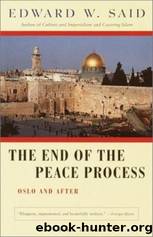The End of the Peace Process: Oslo and After by Said Edward W

Author:Said, Edward W. [Said, Edward W.]
Language: eng
Format: epub
Tags: Politics, History, Fiction, Philosophy
ISBN: 9780307428523
Amazon: B000XU4TCW
Goodreads: 8683029
Publisher: Knopf Doubleday Publishing Group
Published: 2000-01-01T08:00:00+00:00
Chapter Twenty-two
Deir Yassin Recalled
MY PARENTS, SISTERS, and I left Palestine for the last time during the latter part of December 1947; in addition to the family business in Palestine of which he was a partner, my father was in charge of the Egyptian branch, so in effect when we left Jerusalem for Cairo we were returning to somewhere familiar, to a home, schools, friends, etc. The rest of my extended family was not so lucky. By mid-spring of 1948 every one of them on both sides, paternal and maternalâuncles, aunts, cousinsâhad become refugees scattered throughout the Arab world. Most went to Jordan, a few to Lebanon, my paternal aunt and most of her grown children to Egypt, where they joined my father in the business of which they too were partners. I recall quite vividly that though I was twelve at the time, I neither was told much about nor was able fully to grasp the nature of the catastrophe that had overtaken us as a people; I am not even sure that I thought of us as members of a specific people. Our household was totally depoliticized, although we came to feel the difficulties of Palestinian refugees in Egypt as somehow involving us. This was natural enough, since I remember it was quite common to see relatives in very reduced circumstances, worrying about how they were going to pay the rent, find jobs, and so on. During the course of 1948, however, it dawned on me imperfectly and incompletely, I am sure, what a true misfortune had befallen Arab Palestine.
No small role was played in this growing awareness of the question of Palestine by the fragmentary reports I heard around our dinner table in Cairo during the spring and summer of 1948 about the Deir Yassin massacre, which took place on April 9, 1948. My aunt and her daughter in particular had been in Jerusalem (about four kilometers away from Deir Yassin) at the time, but had heard only the desperate and horrified accounts of the ordeal of those 250 men, women, and childrenâinnocents all of themâruthlessly murdered in cold blood by âthe Jews,â as everyone called them. More than any single occurrence in my memory of that difficult period it was Deir Yassin that stood out in all its awful and intentional fearsomenessâthe stories of rape, of children with their throats slit, mothers disemboweled, and the like. They gripped the imagination, as they were designed to do, and they impressed a young boy many miles away with the mystery of such bloodthirsty and seemingly gratuitous violence against Palestinians whose only crime seemed to be that they were there. Yet it was not until almost a decade later that I was able to understand the context and real meaning of what happened at Deir Yassin.
It used to be thought that the massacre was a deliberate but somehow random terrorist incident planned and executed by Menachem Beginâs Irgun. What we now know is that according to Benny Morris the âoperationâ
Download
This site does not store any files on its server. We only index and link to content provided by other sites. Please contact the content providers to delete copyright contents if any and email us, we'll remove relevant links or contents immediately.
| Bahrain | Egypt |
| Iran | Iraq |
| Israel & Palestine | Jordan |
| Kuwait | Lebanon |
| Oman | Qatar |
| Saudi Arabia | Syria |
| Turkey | United Arab Emirates |
| Yemen |
Empire of the Sikhs by Patwant Singh(23070)
The Wind in My Hair by Masih Alinejad(5091)
Rise and Kill First by Ronen Bergman(4778)
The Templars by Dan Jones(4681)
The Rape of Nanking by Iris Chang(4202)
12 Strong by Doug Stanton(3541)
Blood and Sand by Alex Von Tunzelmann(3194)
Babylon's Ark by Lawrence Anthony(2671)
The History of Jihad: From Muhammad to ISIS by Spencer Robert(2618)
No Room for Small Dreams by Shimon Peres(2362)
The Turkish Psychedelic Explosion by Daniel Spicer(2353)
Inside the Middle East by Avi Melamed(2349)
Gideon's Spies: The Secret History of the Mossad by Gordon Thomas(2337)
Arabs by Eugene Rogan(2292)
The First Muslim The Story of Muhammad by Lesley Hazleton(2263)
Come, Tell Me How You Live by Mallowan Agatha Christie(2249)
Bus on Jaffa Road by Mike Kelly(2150)
Kabul 1841-42: Battle Story by Edmund Yorke(2022)
1453 by Roger Crowley(2022)
